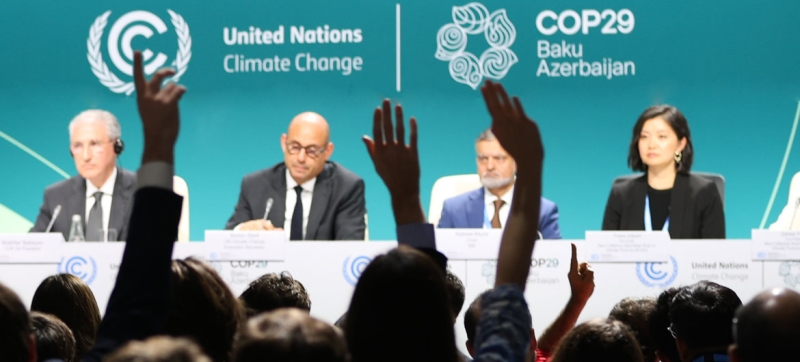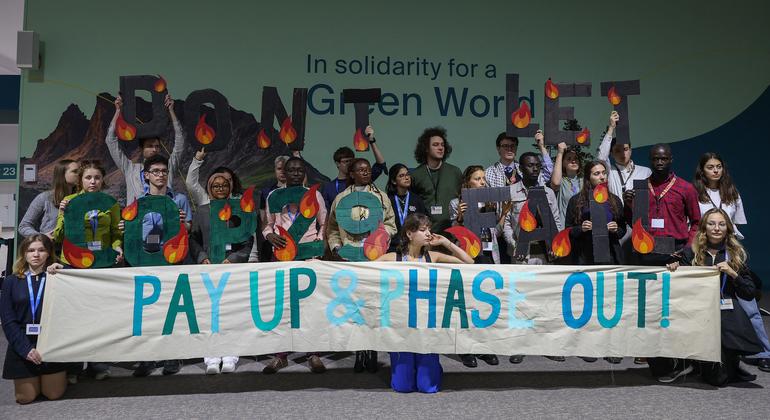
Press conference at COP29 in Baku. G20 sends message to COP29: climate finance target must be agreed Climate and Environment
The G20 leaders gathered for the summit in Rio de Janeiro sent a clear message to the participants of the UN Climate Conference (COP29): “You must not leave Baku without agreeing on a new climate finance target.” This was stated on Tuesday by Simon Steele, head of the UN Framework Convention on Climate Change, commenting on the results of the G20 meeting in Brazil. According to him, success at COP29 is “in the interests of all countries.”
Tense negotiations are continuing behind closed doors at a giant sports complex in Baku, where the 29th UN Climate Change Conference is taking place. Parties must agree on a new climate finance target that will provide each country with the means to implement effective climate action and reduce greenhouse gas emissions. The issue is at the forefront of the G20 leaders meeting in Rio de Janeiro, Brazil.
“The leaders of the world’s largest economies have also committed to financial reforms,” Steele said. According to him, this is “an important signal in today’s world, which is experiencing a debt crisis and the rapidly growing impacts of climate change that are disrupting supply chains and fueling inflation.”
Read also:
Guterres: G20 countries must lead efforts to address global problems
The head of the Framework Convention also noted the importance of nationally determined contributions, calling on G20 leaders to accelerate the pace of the transition to renewable energy sources and a global economy that is resilient to climate shocks.
“G20 delegations have now received instructions [from their leaders] to step up their efforts here in Baku. We urgently need all countries to stop posturing and move forward without delay towards a common position on all issues,” said Simon Steele.
COP29 Topic of the Day
Along with the negotiations to agree on the outcome documents, dozens of meetings, events, and country and organisational pavilions are taking place at COP29. The topic of the day is food, sustainable agriculture and water resources. Delegations from around the world are exchanging experiences in the field of sustainable food production methods and solving problems related to agriculture.
According to the Food and Agriculture Organization (FAO), 94 percent of the world’s countries in their contributions indicate adaptation to the consequences of climate change in agricultural and food systems as a priority task. FAO notes that, thus, reforms in this area will help overcome the climate crisis.
Today at COP29, Azerbaijan, in partnership with the Food and Agriculture Organization, launched a project to help farmers adapt to the impacts of climate change, calling it the “Harmony Initiative.” This is a pressing issue for the country hosting this year’s Climate Conference: half of the population lives in rural areas and more than a third of the labor force is in agriculture.
Speaking at the project launch, FAO Regional Representative for Europe and Central Asia Viorel Gutu spoke of the need to step up action on climate change and transforming agri-food systems.

While agriculture contributes to greenhouse gas emissions, it can also help tackle the crisis if done right. This opinion was expressed in an interview with the UN News Service by Jemima Njuki, head of the Economic Empowerment Unit of UN Women.
She called on governments to provide special support to women-led farms. “Without women, we will not be able to feed the world,” Njuki stressed. At the same time, according to her, women are less likely than men to own the land they farm and have more difficulty accessing loans to grow their businesses.
It’s not just women who suffer, but also other vulnerable groups, such as indigenous peoples. Andrea Echeverri from the Global Forest Coalition, an international NGO that advocates for social and gender justice for rural people, believes that current agricultural practices are destructive to the environment. “Take livestock farming, for example, which requires more and more grazing land, which means that forests continue to be cut down and indigenous peoples are forced off their lands,” Echeverri said.
According to her, governments do not pay due attention to the issue of sustainability of livestock farming, although this sector accounts for about 16 percent of all greenhouse gas emissions and uses 15 percent of all fossil fuels consumed.
Water Resources Management
For the first time, the water problem was reflected in climate documents at the 27th UN Climate Conference. This was stated by Sonja Koppel, Secretary of the UN Water Convention, in an interview with the UN News Service. Meanwhile, water-related problems are extremely acute for many countries today – floods, droughts, shallowing of reservoirs and rising water levels in them affect the well-being of the population, provoke forced migration and undermine food security. For example, in countries such as Kyrgyzstan and Tajikistan, glaciers are rapidly shrinking, threatening long-term water supplies.
“Climate knows no borders, and water resources know no borders,” Sonja Koppel emphasized. “At the same time, water can be both a cause of conflict and the key to its resolution.” According to her, 153 countries share water bodies with other countries, but only 28 percent of them have concluded agreements with their neighbors on cooperation in their management. One of the successful examples is the Central Asian countries, which have overcome disagreements and established transboundary cooperation. Sonja Koppel called on countries to use water resources to establish peace with neighbors and effectively manage their shared natural resources.
